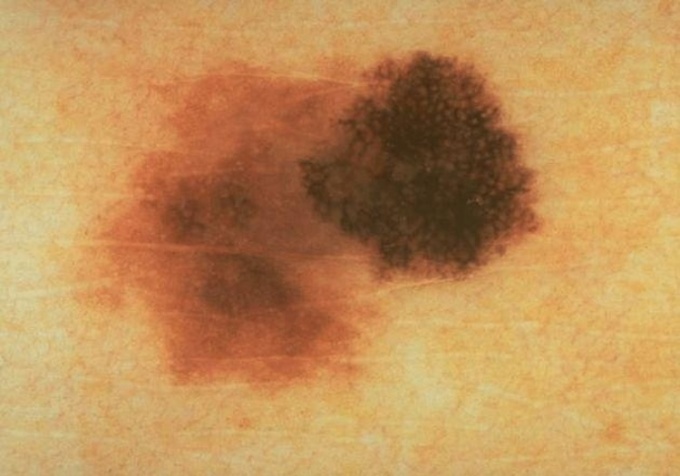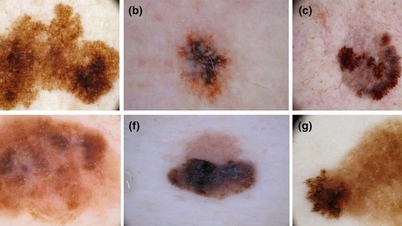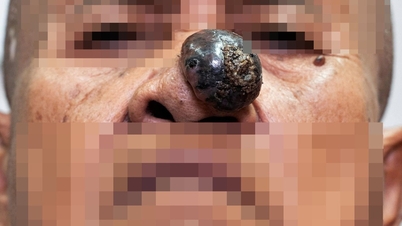The idea that skin cancer only occurs when a mole appears on the skin or when exposed to ultraviolet rays is a misconception about the disease.
According to Dr. Doan Thu Hong from the Vietnam Institute of Applied Medicine, exposure to ultraviolet (UV) rays from sunlight is a common cause of skin cancer, but factors such as family history can also increase the risk of skin cancer.
Here are 10 common misconceptions about skin cancer.
There is only one type of skin cancer.
Incorrect. There are many types of skin cancer, the two most common being basal cell carcinoma and squamous cell carcinoma. More than one million people worldwide are diagnosed with skin cancer each year, a number so high that it's difficult to track all of these cases.
Skin cancer originates in the basal and squamous layers of the skin. Malignant melanoma is less common and usually originates from melanocytes, the skin cells that produce pigment.
The malignant tumor is just a mole.
It's true that all malignant tumors arise from melanocytes, including those found in moles. However, a tumor isn't just a mole that needs to be removed.
Malignant tumors resemble moles, are asymmetrical black in color with irregular borders, grow over time, and sometimes have varying colors within the spot. Most tumors are larger than a pencil eraser, although some may be smaller.
In some people, a precancerous tumor may initially resemble a pimple on the cheek, but it may not disappear for more than six months.

A characteristic image of an asymmetrical mole. Photo: American Academy of Dermatology
Malignant tumors that only appear on the skin.
Incorrect. These spots don't only appear on the skin. Rare forms of melanoma can appear on the eyes (ocular melanoma) and in mucous membranes (mucosal melanoma), in the nose, mouth, or lips.
Non-serious skin cancer
Skin cancer, especially melanoma, can be fatal if not detected early. Malignant tumors tend to spread to other parts of the body. People diagnosed with advanced-stage cancer will require surgery and immunotherapy.
Immunotherapy is now used to treat many different types of cancer, helping the immune system learn how to attack cancer cells, much like it attacks viruses. Some basal cell and squamous cell skin cancers may require radiation therapy after surgery to kill any remaining tumor cells.
People with darker skin are less likely to get skin cancer.
People of any race or skin color can get skin cancer, but it is often overlooked in people with darker skin. Studies show that Black patients are three times more likely to be diagnosed with melanoma at a late stage than white patients.
Communities of color have a higher incidence of a rare type of skin cancer called lentiginous melanoma, which appears on the palms of the hands, soles of the feet, and fingernails.
Malignant tumors only develop after years of sun exposure.
Even a single sunburn can cause long-term damage, not just years of sun exposure. Studies show that a blistering sunburn in childhood or adolescence can double a person's chances of developing melanoma later in life. Repeated sunburns and prolonged UV exposure worsen skin damage.
Sunbathing helps prevent sunburn and skin cancer.
A tan not only doesn't prevent sunburn or skin cancer, but on the contrary, it's a sign that your skin is having problems, as it's damage or a stress reaction to exposure to ultraviolet rays.
Sun exposure damages cells, increasing the risk of skin cancer. Studies show that foundation creams offer similar UV protection to sunscreen.
Makeup can protect the skin.
Some makeup products contain SPF sunscreen, but that's not enough. You should apply sunscreen with an SPF of 30 or higher, and reapply it every few hours.
Only apply sunscreen when going to the beach or pool.
Incorrect. You should apply sunscreen daily every morning, even when indoors. When spending extended periods outdoors, you need to reapply sunscreen every two hours.
Only exposure to ultraviolet rays causes skin cancer.
Exposure to ultraviolet (UV) radiation is the primary cause of skin cancer, but it's not the only factor. Skin cancer can run in families. Rare types of skin cancer affecting the eyes, mucous membranes, backs of the hands, and feet are often not caused by UV exposure. Certain types of moles also increase the risk of skin cancer.
Thuy Quynh
Source link







![[Photo] Prime Minister Pham Minh Chinh visits and encourages doctors, nurses and patients.](https://vphoto.vietnam.vn/thumb/1200x675/vietnam/resource/IMAGE/2026/02/16/1771235096645_ndo_br_dsc-3514-jpg.webp)








































































































Comment (0)